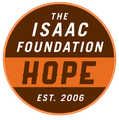


Published:
Never doubt that a small group of thoughtful, committed citizens can change the world; indeed, it’s the only thing that ever has. - Margaret Mead
The quote above is one that we have displayed prominently on our website, and they are words we live by. Existing in the world of rare diseases requires one to have such a mindset - to make a difference in the world of rare diseases, you have to begin with a small group of people. Here in Canada, Isaac is one of just thirteen individuals that suffer from MPS VI. In the broader family of MPS, we’re still talking less than 250 people battling the disease country-wide. That’s 250 people out of 35 million (or just .0007% of our population, for our mathematician supporters!) In essence, we’re a small group. But we think big, and truly believe that we can change the world for our kids.
I have this quote on our website for many reasons - one of them being to remind myself that things are possible, even when we’re facing odds that most people would bet against. Little did I know, that quote would help a government approve a treatment for a little girl who desperately needs it. Little did I know, that quote would help save her life.
The photo above is of Kamie Babineau, a beautiful little girl from a town near Moncton New Brunswick. Kamie’s mom, Parise, connected with me in December 2014, worried that her daughter was suffering from MPS VI - the same disease that Isaac has. The same disease that Jasper and Aleena and Violet have. The same disease we’ve worked tirelessly to find a cure for, the one we’ve had to battle governments to provide life-saving treatment for. Parise was obviously worried for her daughter - she sent me a photo of Kamie and one of Aleena that she found in a newspaper report and felt they shared the same features. One glance at Kamie’s photo told me she was on the right track, but confirmatory tests needed to be done before we could begin the process of setting up treatment for her. Confirmation of MPS VI was given at the end of January, and an application for reimbursement for treatment went into the government of New Brunswick in early March.
If you’ve been following our blog, you’ve seen how difficult it is to access treatment for MPS VI in Canada. It’s expensive (the third most expensive drug in the world, according to this website and many others like it,) and governments are reluctant to cover the cost of the treatment for our kids. Reluctant, even though it’s life-saving. Reluctant, even though it gives our kids the chance at a healthy life. Reluctant, even though it staves off the ravages of the disease, slows down or halts its progression. Reluctant, even though the cost of not treating the disease is sometimes far more costly than treating it when you take into account the costs associated with managing the multi-systemic failures that ensue in children without access to therapy. If you need some reminders on how difficult it is for our kids to get access to treatment in this country, have a look through this collection of news articles and stories. To summarize - it’s difficult, and treatment is rarely approved without a fight.
 I had been told that New Brunswick would be especially difficult to deal with. Indeed, I had already reached out to the Province a few months earlier upon learning that a boy with MPS IVA needed access to treatment and the provincial bureaucrats wouldn’t accept the application for funding because they didn’t have a process in place to review the application. I called and stated my concerns and frustration that an application wouldn’t even be accepted for this child, let alone reviewed and denied. I was told to wait until the bureaurcratic process of a CDR Review was completed and that they would not consider any request for treatment until that time (that review gets completed in 2 days from now!) So, I was prepared for a difficult start to accessing treatment for Kamie, and I wasn’t wrong when I began the process a few weeks ago.
I had been told that New Brunswick would be especially difficult to deal with. Indeed, I had already reached out to the Province a few months earlier upon learning that a boy with MPS IVA needed access to treatment and the provincial bureaucrats wouldn’t accept the application for funding because they didn’t have a process in place to review the application. I called and stated my concerns and frustration that an application wouldn’t even be accepted for this child, let alone reviewed and denied. I was told to wait until the bureaurcratic process of a CDR Review was completed and that they would not consider any request for treatment until that time (that review gets completed in 2 days from now!) So, I was prepared for a difficult start to accessing treatment for Kamie, and I wasn’t wrong when I began the process a few weeks ago.
I again called the bureaucratic branch at the Ministry of Health in New Brunswick that looks after pharmaceuticals, and talked to the same person I had talked with many months earlier. I patiently explained the situation. I had previously sent an email with background information (it wasn’t read until I was on the phone with them), and explained that there were already 9 other children in Canada receiving the same treatment that Kamie desperately needed. I offered to provide all the resources they could ever need to produce a review of the application, including the International Treatment Guidelines (which assert that treatment should begin immediately after diagnosis for best outcomes and that the primary way to deal with this disease is to provide the treatment we were seeking), and the recent 10 Year Resurvey Data (which shows the incredible outcomes for patients with access to treatment over a 10 year period). I also sent in a full folio of MPS VI and other articles showing the benefits that treatment brings to kids suffering from this disease. I offered to connect them with the leading MPS VI experts throughout North America to help them with the data. I expressed and provided ample evidence to show that symptoms that appear prior to treatment beginning cannot be reversed. Many of these symptoms are devastating, and I expressed that we were racing against time to stave off such symptoms and provide Kamie with the quality of life that she deserved, not the quality of life that a disease untreated would leave her with. At the end of our conversation, I asked how the application would be reviewed and when an expected decision would be rendered. I was told, quite bluntly, that they had “no idea.”
This isn’t uncommon when dealing with this disease and applications for reimbursement of treatment. When a disease affects .0007% of a population, we can’t expect governments to know everything about the disease and the process that would be used to review applications for treatment. However, what should be expected is that these types of situations are taken seriously. What should be expected would be for the bureaucrats to spring into action, figure out what review process was needed to deal with the situation, with an immediate and expeditious review undertaken. This is not what happened, unfortunately. Two weeks passed with the same update - they had no idea how they would review the file. In fairness, they did express their hope that it would be approved, but couldn’t figure out exactly how to initiate the file set before them.
 From here, my impatience got the better of me. But it’s an impatience that stems from necessity - necessity to get treatment initiated immediately, the knowledge that Kamie’s disease is progressive and unrelenting, the hope that she can get the help she needs before her body is further deteriorated by MPS. This impatience is where the story changes for the better.
From here, my impatience got the better of me. But it’s an impatience that stems from necessity - necessity to get treatment initiated immediately, the knowledge that Kamie’s disease is progressive and unrelenting, the hope that she can get the help she needs before her body is further deteriorated by MPS. This impatience is where the story changes for the better.
I placed a call into the Minster of Health, Mr. Victor Boudreau. I’ve been fortunate to work with may of the Ministers throughout the country, and I hoped he would take the time to get back to me, hear my concerns, and put a plan in place to look after Kamie’s application. Mr. Boudreau had his staff look into the issue. We connected numerous times over email, and I provided him with details about the frustratingly slow action being taken by the Ministry. What ensued thereafter is something I’ve not seen in this country, from any official dealing with treatment for MPS VI - a determined effort to review the application for funding, and a promise for a prompt resolution/decision for the family.
We scheduled a direct meeting with Mr. Boudreau at his constituency office in Moncton. I hopped on a plane, met with Parise and her husband, and planned out how we were going to handle the meeting. In previous fights for treatment for other kids, we learned to be prepared for anything, and we learned to show governments that we would do anything to help save our children. We were prepared to let Mr. Boudreau know that we weren’t going to go away, that we would do everything necessary to help save Kamie. We were in this for the long haul because treatment for Kamie was our only Hope for her future.
At the meeting, Mr. Boudreau began by telling Parise that cabinet had approved treatment for Kamie. Just like that, her life was changed. Just like that, her life was saved. In two days - two days! - the application was reviewed by Mr. Boudreau’s team, a presentation was put to the government’s cabinet, and an approval was passed. Quick action by Mr. Boudreau changed the lives of this family forever, and I’m incredibly indebted to him for it.
How does this story relate to the quote above? The Minister told us that he was on The Isaac Foundation website to research the disease, our organization, and read about the work we’ve been doing for kids across this country. Displayed prominently at the top of our page is Margaret Mead’s quote, he told us. Minister Boudreau informed us that Premier Gallant, the leader of the government in New Brunswick, uses that quote all the time around the cabinet table. He uses it to inspire his government to do what is right for people. He told us that he took that quote from the website when presenting Kamie’s case to the Premier and told him that his government could be the “small group of people” in this situation. They could be the ones to change the world, even if just for one family.
In all my dealings with governments, bureaucrats, and politicians over the past decade, I have rarely been as impressed as I was with Minister Boudreau on Monday morning. He saw a problem, saw a need for prompt action, saw the need to help a family in need, and went about doing everything he could do to make things better. While I’m sure it’s too early for him to understand what his actions, his passion, and commitment to make a difference really means, I know from experience that he will look back on this and see this as part of the legacy he’s left behind, part of the good he was able to do while in office. Saving someone’s life will remain with you forever and, usually, change who you are for the rest of your life. Just ask Heather Forsyth, leader of the Wildrose party in Alberta, the person who worked tirelessly to save the life of Aleena Sadownyk. Just ask Elizabeth Witmer, the person who did everything in her power to save my son Isaac’s life. I hope Minister Boudreau looks back on this with pride, and I hope his family can learn just how much of a difference he made to the life of a little girl this week.
I know this entry is long, but before I sign off I want to leave you with the other quote I live my life by, one that guides me wherever I go, whenever I get the chance to meet with families battling a rare disease like we are. It comes from my favourite book, To Kill A Mockingbird, from a character whom I wish I could be more like in this world - Atticus Finch. In this novel, Atticus works hard to teach his children about courage. He leads by example, and hopes his children realize that they can make a difference in this world if they truly believe in what they are doing, no matter what the consequences may be for themselves. Atticus tells his daughter that:
“Courage is not a man with a gun in his hand. It’s knowing you’re licked before you begin but you begin anyway and you see it through no matter what. You rarely win, but sometimes you do.”
In many ways, this is exactly what we face when we’re dealing with rare diseases and treatment for our kids. The initial diagnosis is devastating for families. Knowing a treatment exists provides hope, so much hope during those dark days. Families are devastated again when they find out that governments deny access to those treatments - take that hope away - solely based on financial considerations. Expensive treatments aren’t the fault of patients and families, but they bare the consequences. Oftentimes, we fight with grace and courage to get the access to treatment we need, against all odds. Rarely do we win, but sometimes we do. We did yesterday, with the help of Minister Boudreau, and I can’t thank him enough.
So - where do we go from here? Well, there is another child suffering from MPS in his Province who needs access to treatment. He’s the same boy I called the Province about many months ago without success. Perhaps the application we tried to submit many months ago can now be reviewed, and hopefully Mr. Boudreau can do what he can to assist. With help, perhaps the little boy in need can now get the help he deserves. I know I’ll keep trying to make it happen, and I hope to be met halfway by the Government of New Brunswick.
Thanks for hanging in to the end of this entry. It’s a long one, but one of the most important ones we’ve ever logged.
Till next time,
A.